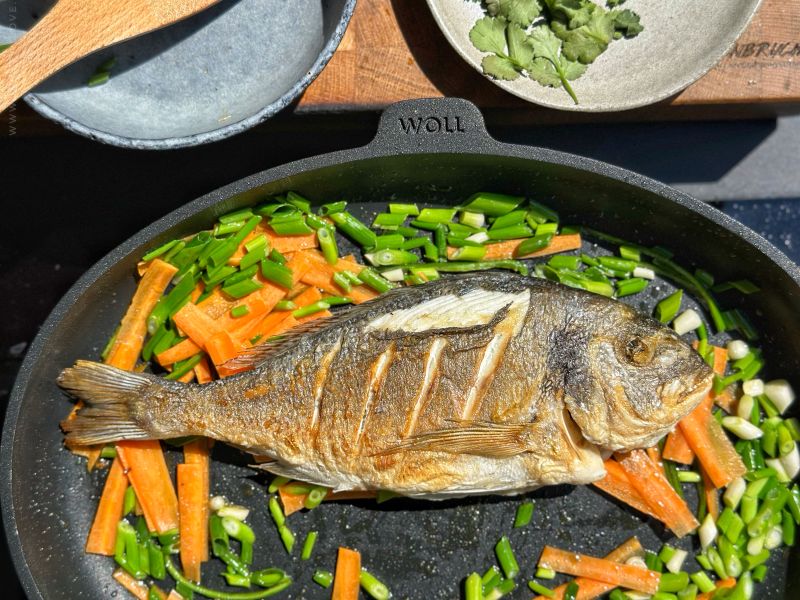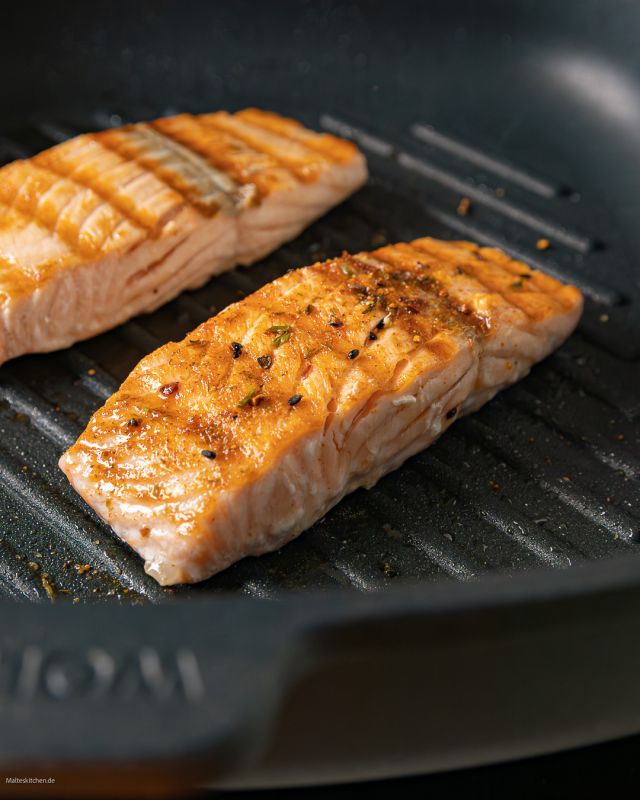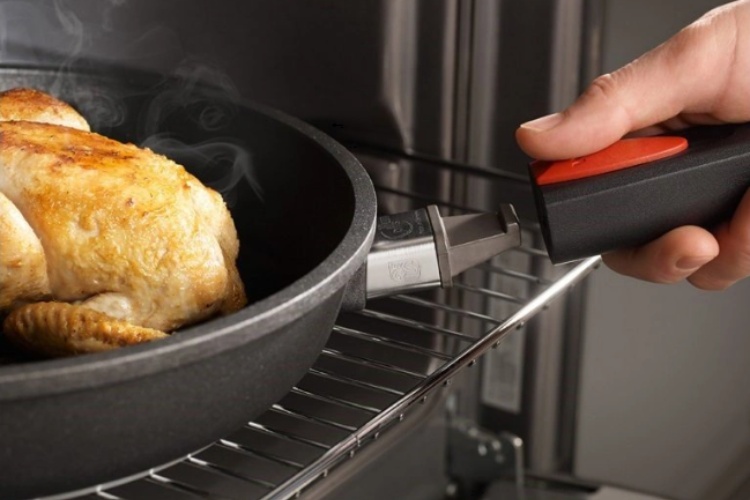In recent years, titanium has become one of the most popular materials in kitchen equipment, including, of course, pans. Its exceptional properties make it the ideal material for modern households and professional kitchens. Let's take a closer look at titanium as a material, its journey to our cookers and the reasons why every keen cook deserves a a proper titanium frying pan.
From the aerospace industry
to our kitchens
Titanium was discovered as early as 1791, but its use in the kitchen only became common in the second half of the 20th century, when its processing technologies became more accessible and economically viable.
Titanium is extremely resistant to corrosion and its light weight provides exceptional strength, making it suitable for many applications including aerospace, medicine and kitchen utensils.
Best titanium pans according to customer reviews
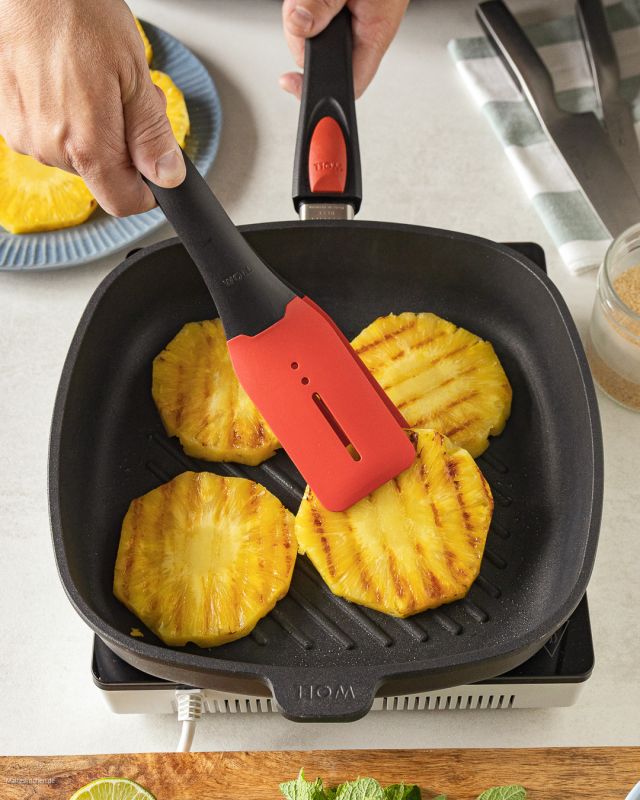
How to care for a titanium pan?
Although titanium boasts great durability and almost unrivalled non-stick properties, even a superman like this will appreciate the right care. Plus, if you do decide to make a bigger investment in titanium pansyou will agree that it is worth pampering it a little.
- Cleaning: Most models of titanium pans can be safely washed in the dishwasher, in which case you will appreciate the pieces with a removable handle, which will not unnecessarily burden other dishes in the dishwasher. However, due to the non-stick nature of titanium, it is not difficult to wash the pan with a soft sponge or cloth in your hand. Always check the compatibility with your dishwasher for your specific model.
- Avoid extremes: Although titanium itself is unusually durable, it is advisable to avoid using it at extremely high temperatures for some surface treatments.
- Storage: The jewel in the form of a titanium pan also deserves a comfortable fit. To prevent unwanted damage (and this doesn't just apply to titanium ones), store pans so they don't stack on top of each other, or use protective pads.
Advantages and disadvantages of titanium pans
Why say YES to titanium?
- High resistance: Titanium pans are very resistant to scratching, warping and corrosion, which means they will last you many years without any signs of wear.
- Healthy cooking without chemicals: Modern titanium pans are made without the use of PFOA and PTFE, which are chemicals often used in non-stick surfaces but can be potentially harmful at high temperatures.
- Great non-stick - less grease: Thanks to the extremely non-stick surface, the preparation of roasts on titanium pans "swallows" even the bare minimum of fat.
- Fast warm-up: Titanium conducts heat less easily than, for example, aluminium, but thanks to its strength, titanium pans can be fitted with thinner bottoms and walls, which allows them to heat up to the desired temperature much more quickly.
- Use in oven, dishwasher, induction: Some of the models of titanium pans we offer have practical removable handles for easier storage, use in the oven and less space in the dishwasher. Titanium pans with ferromagnetic bottoms can also cope with induction hobs - but always check the specific model.
What are the disadvantages of titanium?
- Price: The high cost of titanium and the complexity of its processing is reflected in the price of titanium pans, which can be more expensive than their counterparts made from other materials. But on the other hand, with proper care of a titanium pan, this investment can be the last one.
- Thermal conductivity: Pure titanium has a lower thermal conductivity compared to materials such as copper or aluminium, but this is often compensated for by the use of titanium alloys or combinations with other materials.
Do they all work?
Titanium pans for induction
Not all titanium pans are automatically compatible with induction cooktops because induction cooking works on the principle of magnetic induction, which requires cookware to contain ferromagnetic material such as iron or some types of stainless steel.
When choosing a titanium pan for induction cooking, it is therefore important to look for information from the manufacturer that confirms its compatibility with induction hobs. In case you already own a titanium pan and are unsure whether it is suitable for induction, you can simply use a magnet to test whether the pan reacts with it. If it does, it is likely to work on an induction hob.
Titanium pan with quality guarantee:
Rely on the German brand WOLL
In Kulina you will find mainly titanium representatives of the German company WOLL. Brand WOLL is known for its high quality and innovation in the field of kitchenware, especially when it comes to their range of titanium pans. We didn't choose WOLL products by chance - they have a few key features that we'd give a pan a thumbs up for:
Multilayer construction
WOLL pans often use a multi-layer construction that combines the high durability of titanium with the superior thermal properties of other materials, such as aluminium, for even heat distribution.
Surface treatment
The surface of WOLL pans is usually treated with a special non-stick coating that is reinforced with titanium particles. This makes the surface extremely resistant to abrasion and allows easy cooking with minimal use of oil or fat.
Compatibility with different types of hobs
Many WOLL frying pan models are designed to be compatible with different types of hobs, including induction. This makes them very versatile and suitable for a wide range of kitchen styles.
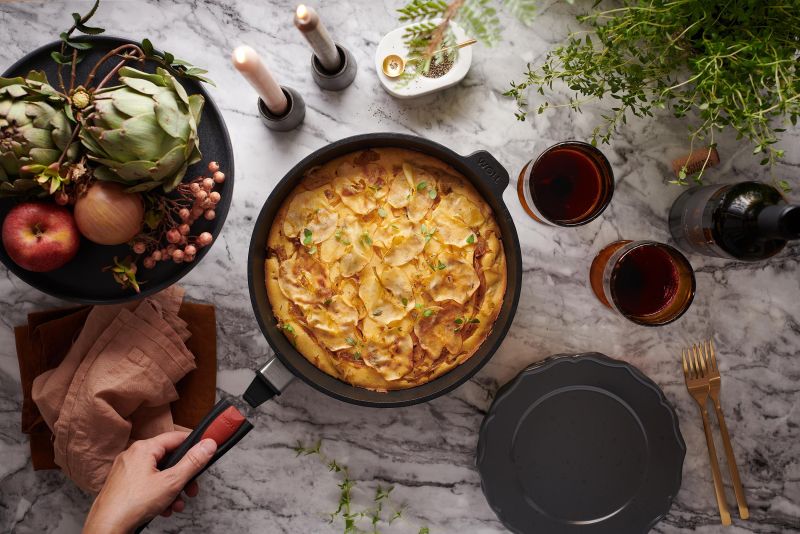
Durability and long service life
WOLL pans are known for their durability and ability to withstand heavy use. Titanium reinforcement and quality construction ensure that these pans will last for many years without signs of wear.
Design and functionality
In addition to technical features, the WOLL brand also emphasises design and practicality. The pans offer ergonomic handles, safety lids and often features that make cooking easier, such as pouring rims.
Safe materials
WOLL pans are made from materials that are free of harmful chemicals such as PFOA, ensuring that cooking is not only efficient but also safe for your health.
Our tip
Read
Also

Woll pans: Almost indestructible cookware
Find out what's behind the enduring quality of Woll pans and why you shouldn't miss out.
Titanium pots
Of course, titanium is not only used for pans, its great properties can also be appreciated in titanium pots.
The main advantage of titanium pans is their high durability, long service life and perfect non-stick properties. The titanium coating is extremely scratch and wear resistant, ensuring that the pans will last in the kitchen for many years without losing quality. In addition, thanks to their high heat resistance, they allow efficient cooking even at high temperatures.
Yes, titanium pans are completely safe for cooking. The materials used to make titanium pans do not contain harmful chemicals such as PFOA or PTFE, which can be present in some non-stick coatings. Titanium is considered inert and biocompatible, meaning it does not interact with food and does not release harmful substances.
Yes, unlike some non-stick pans, you can safely use metal utensils with titanium pans. The titanium coating is very scratch-resistant, which means that metal utensils such as turners or whisks will not damage the surface of the pan.
To maintain the quality and extend the life of your titanium pan, we recommend hand washing with a mild detergent and water after each use. Although some titanium pans are labeled as dishwasher safe, hand washing is gentler and helps keep the surface of the pan in optimal condition. It is also advisable to avoid extreme temperature shocks, such as moving the pan from a hot stove directly into cold water.

